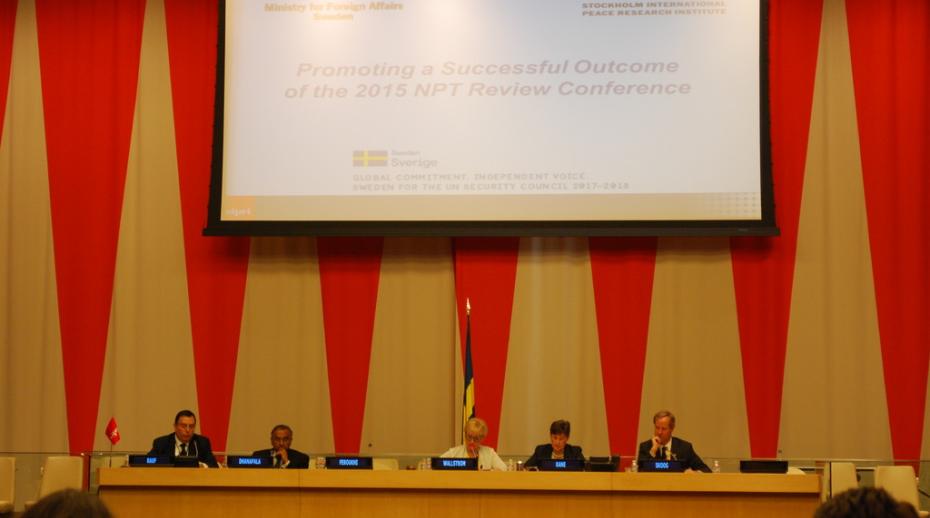
On 27 April 2015, the opening day of the 2015 Review Conference of the Treaty on the Non-Proliferation of Nuclear Weapons (NPT), at the United Nations in New York, SIPRI organized a discussion forum entitled Promoting a Successful Outcome of the 2015 NPT Review Conference with the collaboration of the Ministry of Foreign Affairs of Sweden.
H.E. Mr. Olof Skoog, Ambassador and Permanent Representative of Sweden to the United Nations, opened the discussion forum and welcomed the representatives of states, international organizations and civil society. Tariq Rauf, Director of SIPRI’s Disarmament, Arms Control and Non-Proliferation Programme, served as moderator and introduced the speakers and chaired the discussion.
The keynote address was delivered by H.E. Ms. Margot Wallström, Minister for Foreign Affairs of Sweden, who affirmed the continuing importance of the NPT for global security and emphasized the necessity of implementing treaty commitments and revitalizing the UN disarmament machinery—the Conference on Disarmament (CD) and other multilateral arms control negotiating fora. The Minister highlighted the relevance of the concept of human security in promoting international peace and security, and the important role of civil society in discussions and diplomacy on nuclear disarmament and nuclear non-proliferation. She concluded by highlighting Sweden’s contribution to the International Monitoring System (IMS) of the Comprehensive Nuclear-Test-Ban-Treaty Organization (CTBTO), the importance of securing entry-into-force of the CTBT and of Sweden’s return to actively promoting the achievement of a world free of nuclear weapons. She pointed to the high costs of nuclear armaments and the economic burden of these weapons.
H.E. Ambassador Ms. Taous Feroukhi of Algeria, President of the 2015 NPT Review Conference, focused on the negotiations that lay ahead during the review conference and stressed the importance of reaching an agreed outcome that built upon the successes of previous NPT review conferences in 1995, 2000 and 2010. The Conference President highlighted the importance of evidence of implementing agreed NPT outcomes, fair standards of assessing such evidence, and political will to reach agreement at the 2015 review conference.
H.E. Ms. Angela Kane, UN High Representative for Disarmament Affairs, highlighted the necessity of having common expectations of the NPT regime, full compliance with the treaty and review conference agreements, consensus on implementing agreed NPT outcomes, reaffirmation of the need to eliminate all nuclear weapons, and reaffirmation of implementing the Resolution on the Middle East zone free of nuclear weapons that was adopted by the 1995 NPT review and extension conference.
H.E. Ambassador Jayantha Dhanapala, President of the 1995 NPT Review and Extension Conference, Deputy Chairperson of SIPRI and President of Pugwash, recalled the continuing regression in the implementation of NPT review conference outcomes of 1995, 2000 and 2010, and called for states to break out of their ‘cocoons of complacency’ regarding the elimination of nuclear weapons. Ambassador Dhanapala reminded the audience that there are still more than 16,000 nuclear warheads in the possession of nine states, with the United States and the Russian Federation accounting for 93 per cent of the warheads. He highlighted that civil society had revealed in a ‘Don’t Bank on the Bomb’ report that about 400 different banks, insurance companies and pension funds had invested some $400 billion in 28 companies in the nuclear weapons industry—and called for support for a disinvestment campaign launched by civil society to undermine this industry.
In his opening comments, Tariq Rauf reminded the audience that this year will mark the 70th anniversary of the world's first nuclear detonation, the 'Trinity Test' in July 1945; the 70th anniversary of the use of nuclear weapons in August 1945; and the 20th anniversary of the indefinite extension of the NPT in 1995. He noted that this year’s NPT conference—the ninth review conference since 1975—bears a heavy historical burden for global nuclear governance and in that context he called upon all States Parties to ensure a successful outcome through shared principles and objectives, as well as flexibility and compromise, to strengthen the authority and integrity of the NPT. Rauf recalled that flexibility and compromise were some of the principles held by the President of the very first NPT Review Conference in 1975, Ms Inga Thorsson, Under-Secretary of State of Sweden. He noted that Ms Thorsson had said in 1975 that ‘Over the world people of goodwill and common sense and knowledge are looking to the Conference for positive results’, and he stressed that these words are also relevant to this year’s NPT conference.
Some 150 participants were in attendance at the discussion forum, including ambassadors and delegates from Austria, Botswana, Colombia, Croatia, Cyprus, Czech Republic, Egypt, European Union External Action Service, Finland, France, Germany, Italy, Japan, Kazakhstan, Kyrgyzstan, Mexico, Mongolia, Morocco, Nepal, Netherlands, New Zealand, Norway, Pakistan, Palau, Peru, Portugal, Romania, Russian Federation, Singapore, Slovenia, Spain, Sudan, Sweden, Switzerland, Turkey, United Kingdom, United States, The Vatican, Yemen, and the Comprehensive Nuclear-Test-Ban Treaty Organization, the Organization for the Prohibition of Chemical Weapons and the United Nations; as well as civil society organizations, including Mayors for Peace, Citizens for Global Solutions, The Simons Foundation and the Woodrow Wilson Centre for International Scholars, among several others.
Check out SIPRI's NPT page and contact Stephanie Blenckner with any questions.